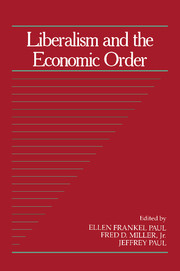Book contents
- Frontmatter
- Contents
- Introduction
- Acknowledgments
- Contributors
- The Social Market Economy
- From Post-Communism to Civil Society: The Reemergence of History and the Decline of the Western Model
- Asymmetrical Reciprocity in Market Exchange: Implications for Economies in Transition
- Institutions, Nationalism, and the Transition Process in Eastern Europe
- The Economic and Political Liberalization of Socialism: The Fundamental Problem of Property Rights
- Democracy, Markets, and the Legal Order: Notes on the Nature of Politics in a Radically Liberal Society
- Liberalism: Political and Economic
- Socialism as the Extension of Democracy
- Liberalism, Welfare Economics, and Freedom
- Some Rules of Constitutional Design
- The Morality of Inclusion
- A New Contractarian View of Tax and Regulatory Policy in the Emerging Market Economies
- Associations and Democracy
- Index
A New Contractarian View of Tax and Regulatory Policy in the Emerging Market Economies
Published online by Cambridge University Press: 05 October 2010
- Frontmatter
- Contents
- Introduction
- Acknowledgments
- Contributors
- The Social Market Economy
- From Post-Communism to Civil Society: The Reemergence of History and the Decline of the Western Model
- Asymmetrical Reciprocity in Market Exchange: Implications for Economies in Transition
- Institutions, Nationalism, and the Transition Process in Eastern Europe
- The Economic and Political Liberalization of Socialism: The Fundamental Problem of Property Rights
- Democracy, Markets, and the Legal Order: Notes on the Nature of Politics in a Radically Liberal Society
- Liberalism: Political and Economic
- Socialism as the Extension of Democracy
- Liberalism, Welfare Economics, and Freedom
- Some Rules of Constitutional Design
- The Morality of Inclusion
- A New Contractarian View of Tax and Regulatory Policy in the Emerging Market Economies
- Associations and Democracy
- Index
Summary
INTRODUCTION
Recent decades have seen a resurgence of contractarian thinking about the nature and origins of the state. Scholars in this tradition ask what constraints rational, self-interested actors might deliberately impose upon themselves. In response, Hobbes, Rousseau, Locke, and other early contractarians answered that laws of property were an attractive alternative to “the war of all against all.” More recently, James Buchanan, Russell Hardin, Mancur Olson, Gordon Tullock, and others have used contractarian principles to justify laws that solve a variety of Prisoner's Dilemmas and other collective-action problems. And in the distributional realm, John Rawls and others have applied contractarian analysis to investigate how material wealth ought to be allocated among people.
Contractarianism is of special interest now as the countries of Eastern Europe and the former Soviet Union face the task of forging new political and economic institutions. With contractarian thinking already evident in the discussion surrounding the current transition, it is an opportune moment to reexamine the foundational assumptions of contractarian analysis.
At the heart of contractarian analysis lies the assumption that people are rational, self-interested actors. In this essay, I will argue that contractarianism's reliance on the self-interest model has obscured the true rationale behind many of the West's most important laws and institutions. I will argue for a more general version of contractarianism, one based on a characterization of preferences that is more easily defensible, on both theoretical and empirical grounds, than that of the self-interest model. Without abandoning the essence of the contractarian mode of analysis, this alternative approach promises a more complete and coherent account of the activities of the state.
- Type
- Chapter
- Information
- Liberalism and the Economic Order , pp. 258 - 281Publisher: Cambridge University PressPrint publication year: 1993
- 1
- Cited by



